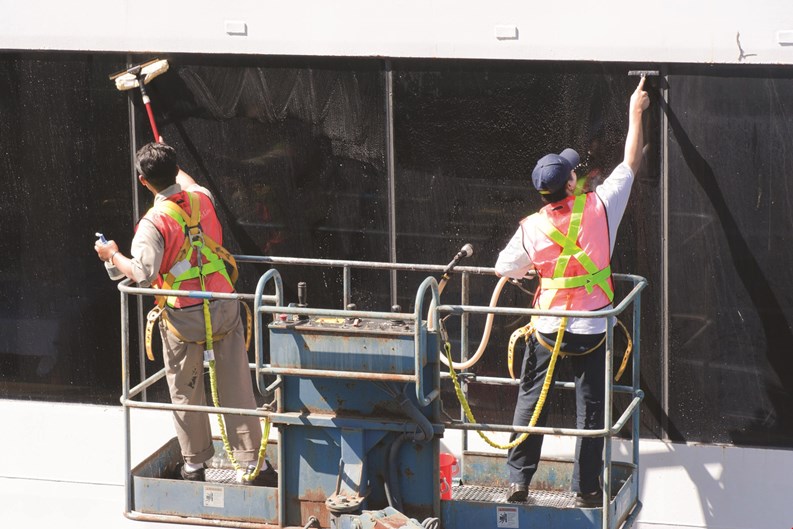When your building or association is faced with an exterior maintenance or repair job, it’s important that you don’t just hire the first contractor who comes along; carrying out your due diligence can make the difference between working cooperatively with a contractor to get the project completed on time and on budget, or winding up with partial or poorly-done work and a mess of legal problems after the fact.
Exterior contractors are a breed all their own. Those who specialize in masonry, painting, paving, heck, even the big dogs like architects and engineers, need certain qualifications in order to perform their work competently. A condominium or homeowners’ association board depends on these professionals, and cannot go into any project, half-cocked, without fear of betraying its fiduciary duty to ownership. This means that boards need to solicit multiple bids from vendors, thoroughly vet contenders before hiring, and stay on top of every aspect of a project as it progresses, lest something go awry. How does a board do this, exactly? Well, that’s what we intend to find out.
Regulators
In order to properly vet an exterior contractor, it helps to know which municipal, city and state regulations govern them. And while qualifications required vary depending on a particular contractor’s trade or even the locality, requiring a board to bring a modified checklist to any new project, there are certainly some basic guidelines upon which to rely.
“Just starting on the city of Chicago level, the Department of Buildings is the entity that will issue a license to a general contractor,” explains Keith Hales, president of Chicago-based Hales Property Management. “Contractors should have licenses [either general or for their specialized trade, when applicable] from Chicago, the state of Illinois, their businesses should be registered, and they should have the proper insurances. And also, it’s worth noting that, in Illinois, any property managers that are coordinating this work must have their community association manager, or CAM, license.”
Doing the Work
While it’s certainly important that a professional prove his or her qualifications, having passed a series of tests does not a good contractor make. “It doesn’t take a lot to get licensed, whether state or local, and it’s not necessarily the best indicator as to whether a contractor will perform well in any given circumstance,” says Jeffrey S. Youngerman, an attorney with the law firm of Flaherty & Youngerman in Chicago.
So what exactly should an association be looking for when considering potential hires? “Check a contractor’s references,” urges Youngerman. “What do they have to say about this company’s work? Assuming the company is capable and financially responsible, how easy are they to work with? You always want to hire a company that specializes in the area with which you’re dealing.”
A general contractor can bring added value to any job, but may not be entirely necessary on smaller projects. “General contractors are best used on contracts of significant value,” says Youngerman. “They provide important oversight, especially when work will be ongoing for an extended period of time over multiple buildings. But if you have a small siding job, and it’s not going to involve more than a single building, then you may not require a general contractor. You could just work with a siding specialist—one that might operate more like a subcontractor on those larger jobs—for that specific type of repair. The main thing is that the contractor has knowledge and expertise in the specific area of your repair, and you can go about the business of requesting references for jobs that were similar in nature, contact those people, even drive out and see for yourself how their work looks.”
A board should constantly be on the lookout for a contractor trying to upsell them and bite off more than it can chew, warns Hales. “You might encounter a one-man masonry person who will tout his ability to take on an entire 60-unit building. But then that may take him an entire year. So you need to assess your project and make sure that a contractor is properly sized.”
And even if a contractor shows all signs of being an upstanding service provider, small details such as the length of time a crew has been together can provide nuance when making a hire. “When surveying a contractor’s former projects, find out how long ago they were completed,” suggests Youngerman. “You can encounter a company that has an entirely new staff, and the quality of work they’d referenced was solely dependent on the last group. Or it wasn’t even the business owner’s crew. He just hired people off the street. In those cases, there’s no continuity of quality.”
Youngerman also recommends checking with other related professionals that may be familiar with a contractor. “As a construction litigator as well, I can certainly verify the better contractors in the region. Talk to your management firm, ask them if they’ve worked with the contractor before. And ask the contractor squarely what they specifically are trying to do. Are they going to encourage you to go out and solicit an architect or engineer to come in and very specifications for you to bid on, or are they themselves trying to be the designer for your repairs? Because if a contractor comes in and says he has the solution to your problem himself, and encourages you not to hire an architect or engineer, then run for the hills. He doesn’t want accountability.”
And, per usual, a qualified property manager can act as a trusty navigator throughout the process. “Our company actually specializes in construction management as well as property management,” notes Hales. “So we can act as an owner’s representation to make sure that they’re getting the best possible price, and we can compare various contractors’ profiles apples-to-apples. We can also generate a scope sheet, where we can put a matrix together analyzing the discipline in question, with contractors at the top and specific items at the side, via which we can ensure that said contractors are bidding on the appropriate specifications, and then we’ll submit that to the board, and sometimes offer our own recommendations. Of course, the goal is to make this all incredibly easy to digest.”
On the Hiring Line
Having heard from attorneys and property managers alike on the topic of exterior contractors, it would feel downright criminal not to check in with one of the hands-on professionals doing the dirty work themselves. Enter Joseph Baran, president of Dependable Construction.
“In Chicago, as well as in broader Illinois, they require all types of licenses, depending on the work you perform,” says Baran. “If you want to do roofing, you need to be a licensed Illinois roofing contractor, which I am. I’m also both a licensed masonry contractor, and a general contractor in the city of Chicago.”
Baran can speak firsthand as to the degree of difficulty in obtaining the various licensing mentioned throughout. “The general contractor’s license is honestly not that difficult to get,” he acknowledges. “But to receive either a mason’s license or a roofing license—the latter of which I’ve an unlimited license that allows me to perform commercial, industrial or residential work—you have to pass quite an extensive test. And it’s also extremely important to be able to provide proof of insurance.”
Baran gets many of his gigs via referrals, but also advertises on Angie’s List and via the Better Business Bureau, and finds all three effective. And while he mostly does his own work, he’ll occasionally hire a subcontractor, for which he’s responsible, as an association would be responsible for its own contractor. “In those rare cases in which a subcontractor is required, I’ll only work with one with which I’ve dealt before and have known for some time.”
One variable worth noting when hiring a contractor is that the seasons matter. “We really won’t do masonry during the winter,” says Baran. “The weather definitely has its effects. People will argue that it’s nice during the day, but if it gets to be freezing at night, or if it freezes within 30 days after the work is completed, they just won’t be getting the best job.”
Hales doubles down on these weather concerns, and urges associations to be prudent. “One thing that boards tend not to do during the winter is consider their spring projects soon enough,” he says. “They wait until April, when spring is upon them, but all the other associations are doing work then, and the first availability for a contractor is the summer.”
On a related note, Hales urges boards to exercise patience in some cases. “Many have a ‘hurry up and wait’ mentality,” he says. “Once they pull the trigger on a job, they expect it to be done the next day, but that’s not how it works. It’s difficult to convey this expectation to them. They’ll tell us ‘we need to get this done, next week. Whatever it takes,’ and we need to explain how they’re risking the work will be done poorly by a subpar contractor.”
Buyer Beware
Associations looking to cut corners and opt for the cheapest contractor in the game should be warned: Don’t do that. It’s dumb.
“There’s value in understanding that you shouldn’t just get a proposal from a contractor and then sign it,” says Youngerman. “I assure you that some contractors would love for you to do that, because those proposals in some respects say that the contractor will do X work, include some semblance of scope, state a price, and that’s that. But where in that agreement does it provide for a certain express warranty? Where does it provide for what type of insurance the contractor will have? That there’s going to be indemnity for mistakes made and damage caused? It might cost you a few bucks to hire a lawyer to look at the contract, but it’s worth it. You have to have, in regard to due diligence, these basic protections incorporated into these contracts, because of the kind of harm that will come about.”
Baran has seen this firsthand among fellow tradesmen. “I have met contractors and asked them if they carry workmen’s compensation/public liability insurance, and they’ll say ‘why? the homeowner has insurance.’ And while, yes, that may be true, that is by no means what the insurance I’m talking about is for.”
And Hales asserts that, when a manager advises a board against hiring a friend or relative to do even a simple job, it’s not personal. “If your hypothetical Uncle Smith were to slip and fall working on your property, the association could be held liable, and potentially be forced to shell out workman’s comp for an indefinite period. It’s sometimes a difficult conversation to have.
“Relationships are important between managers and boards, and they’re only successful if there’s a trust factor there,” says Hales. “Boards need to trust that management is acting in their best interests to ultimately execute whatever project is being undertaken safely, timely and at an affordable cost.”
Michael Odenthal is a staff writer for The Chicagoland Cooperator.










Leave a Comment